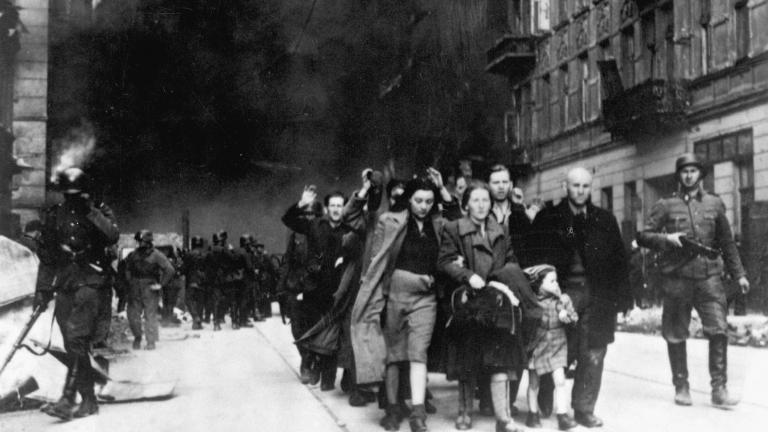
But Alt! But Alt! When the Church says deportation is evil, it has in mind the deportations that took place in World War II. You know, like that pic. That’s the Warsaw Ghetto uprising. Jews were citizens. The Church doesn’t have in mind deportation of criminals who are in a country illegally. The Church has never taught that all deportation is evil.
Is that so? Is it? Now, you know, dear reader, I believe in going to Church texts to find out what the Church teaches. So in this case, I’m going to go to Veritatis Splendor 80—see, I link to them too, so you can check me out. Pope St. John Paul II begins by defining the term “intrinsic evil”:
Reason attests that there are objects of the human act which are by their nature “incapable of being ordered” to God, because they radically contradict the good of the person made in his image. These are the acts which, in the Church’s moral tradition, have been termed “intrinsically evil” (intrinsece malum): they are such always and per se, in other words, on account of their very object, and quite apart from the ulterior intentions of the one acting and the circumstances. Consequently, without in the least denying the influence on morality exercised by circumstances and especially by intentions, the Church teaches that “there exist acts which per se and in themselves, independently of circumstances, are always seriously wrong by reason of their object.”
A person’s intentions and circumstances matter only to the extent that they might mitigate culpability; that’s what JP2 is getting at in the middle section. But an intrinsically evil act is one that is always evil regardless of the circumstances. They are evil of themselves. No intention, no circumstance can make them licit.
So, for example, no one may say, “I was poor, and therefore that makes my abortion okay.” Such a circumstance may certainly mitigate the culpability of the person procuring the abortion; but it does not transform the abortion, of itself, into a morally good, or even neutral, act. It remains evil. That is true as well of contraception. It is true of sex between two men or two women.
But watch carefully now, because John Paul II, quoting Gaudium et Spes, is going to make a list of actions that are intrinsically evil.
Whatever is hostile to life itself, such as any kind of homicide, genocide, abortion, euthanasia and voluntary suicide; whatever violates the integrity of the human person, such as mutilation, physical and mental torture and attempts to coerce the spirit; whatever is offensive to human dignity, such as subhuman living conditions, arbitrary imprisonment, deportation, slavery, prostitution and trafficking in women and children; degrading conditions of work which treat labourers as mere instruments of profit, and not as free responsible persons: all these and the like are a disgrace, and so long as they infect human civilization they contaminate those who inflict them more than those who suffer injustice, and they are a negation of the honour due to the Creator.
So Vatican II includes deportation on the same list as abortion and euthanasia as intrinsic evils.
Later, in VS 81, the pope says that a “good intention” or “circumstances” may “diminish” the evil. But—and this matters—“they cannot remove it.”
they are not capable of being ordered to God and to the good of the person.
Nothing can make such acts good. Nothing can make them “defensible as a choice.”
But John Paul II is not done. In VS 82 he warns against using “my intentions were good” as an excuse. There is no such thing as a good intention with an intrinsically evil act. An intention can only be good, he says, “when it has as its aim the true good of the person.” But the kind of acts named by Vatican II “are not capable of being ordered to God and the good of the person.”
And one such act is deportation.












